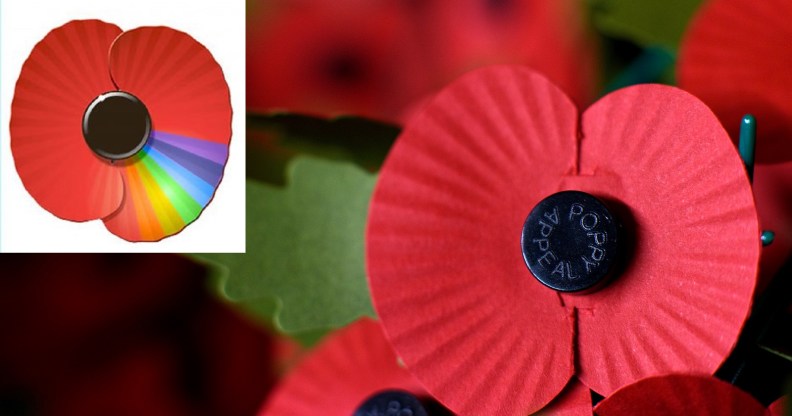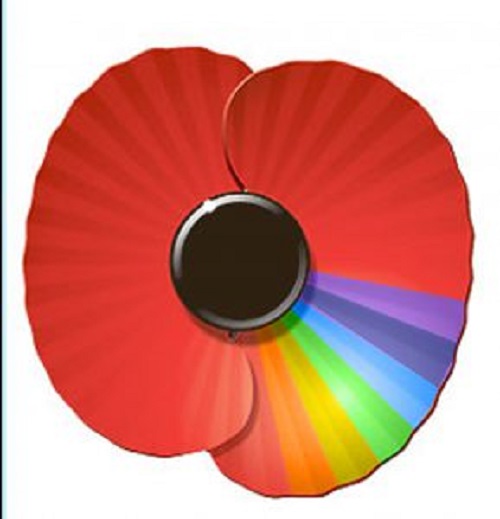LGBT rainbow poppy met with anger on Remembrance Day

L – A rainbow poppy. R- Poppies are packaged for shipping by volunteers at the The Royal British Legion Poppy Appeal Headquaters (Ben Pruchnie/Getty)
Pride organisers were accused of “defacing” the Poppy on Remembrance Day, after posting a rainbow poppy design.
Doncaster Pride posted the picture of a remembrance poppy, including a rainbow segment, to their Instagram page on November 11, to mark the centenary of the end of the First World War.
The Pride organisers were promptly attacked on social media for incorporating a rainbow into the traditional design of the poppy, which is sold by the Royal British Legion to commemorate war dead and raise funds for veterans.
The photo rapidly spread on a local Doncaster Facebook group, where users tore into the image for “defacing a century old symbol.”

The Doncaster Pride rainbow poppy post has come under fire.
Rainbow poppy sparks angry response
One user wrote: “Not a time for PC brigade to start limp wristing. No respect. Find your own movement. Don’t hijack the poppy!”
Another hit out at LGBT+ people who “always make it about themselves,” while others claimed it is “antagonistic to co-opt the Poppy for any agenda.”

The rainbow poppy has sparked anger.
Others called the change “pathetic,” “self-indulgent” and an “absolute disgrace,” while one local fumed: “Shame on LBGT for trying to hijack our poppy.”
Several locals made attempts to defend the symbol, however, pointing out the significance of LGBT+ people including Wilfred Owen and Siegfried Sassoon to World War One, and Alan Turing to World War Two.
Others pointed out that there are many other variants of the poppy, including the white pacifist poppy, and the purple poppy for animals who died in war.
The rainbow poppy design was first posted by LGBT poet Trudy Howson, who wrote in 2016: “The rainbow poppy is a campaign I’m running to bring attention to the brave soldiers who died for our country during WWI at a time when their sexuality was still criminalised.”
It is unclear whether the rainbow poppy was actually manufactured.
The post has now been deleted from the Doncaster Pride Instagram page, after the wave of criticism.
A spokesperson for Doncaster Pride told PinkNews: “The reaction to this post has been surprising and very disappointing.
“Firstly, there was no intention to offend, hijack the remembrance for the LGBT+ community nor indeed any of the other negative and disrespectful accusations this post has provoked.
The Doncaster Pride spokesperson continued: “The post was designed to acknowledge the bravery of serving LGBT+ armed forces personnel and as a mark of respect to all those that have served their country in the past, many serving whilst hiding their true identity.
“It was also our intention to remember and give thanks for the bravery of every member of our armed forces, irrespective of their sexuality, who by their sacrifices and actions have given us the freedoms we enjoy today.”
Doncaster Pride added: “What is disappointing is the response to the post, the misunderstanding of its sincerity, the levels of hatred towards our actions and even worse those people feeling this was an opportunity to randomly attack the LGBT+ community.
“This level of hatred towards the community we represent has shocked us and as a result we will redouble our efforts to ensure we continue to deliver pride events and campaigns that educate and inform.
“Doncaster Pride did not wish to cause offence, however if this is the case, we unreservedly apologise.”
LGBT+ heroes of World War One and World War Two
Gay people were banned from openly serving in the UK armed forces until 2000, but many LGBT+ people have been central to war efforts over the years — though their sexuality was long erased from historical accounts.
Poet and soldier Wilfred Owen captured the horrors of the First World War, publishing works including “Dulce et Decorum est,” one of the most famous works to come out of the war.
Although he lived at a time when homosexuality was illegal, historians believe the poet was gay — and that his relationship with fellow poet Siegfried Sassoon was romantic and sexual.
Like Owen, Sassoon served on the Western Front during the First World War, and is known to have had love affairs with a number of men.
Although Owen’s personal diaries were heavily censored by his relatives before release, letters survive in which he wrote to Sassoon of a “holy secret” they shared, adding: “I love you, dispassionately, so much, so very much, dear Fellow, that the blasting little smile you wear on reading this can’t hurt me in the least.”

Alan Turing (Creative Commons)
During World War Two, computer scientist and codebreaker Alan Turing worked at Bletchley Park to crack the German Enigma codes, which is widely believed to have led to the war ending earlier than expected.
Turing, often hailed as the grandfather of modern computing, was convicted of ‘gross indecency’ in 1952 after having sex with a man, and was chemically castrated, barred from working for GCHQ, and driven to suicide.
There is now a campaign to put Turing on the £50 note.

